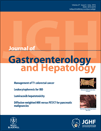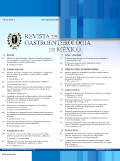
Pediatric Gastroenterology Hepatology & Nutrition
Scope & Guideline
Exploring the frontiers of gastroenterology and nutrition in children.
Introduction
Aims and Scopes
- Pediatric Gastroenterology:
Investigates various gastrointestinal conditions affecting children, including functional gastrointestinal disorders, inflammatory bowel disease, and liver diseases. - Nutritional Interventions and Assessments:
Focuses on the nutritional needs and interventions for pediatric patients, including the impact of nutrition on growth, development, and disease management. - Clinical Trials and Evidence-Based Practices:
Publishes studies that evaluate the efficacy and safety of treatments and interventions in pediatric gastroenterology, providing evidence for clinical decision-making. - Epidemiological and Public Health Studies:
Explores the prevalence and risk factors associated with gastrointestinal and liver diseases in pediatric populations, contributing to public health knowledge. - Innovative Diagnostic and Therapeutic Techniques:
Highlights advancements in diagnostic methods and therapeutic approaches, including endoscopic procedures and novel pharmacological treatments.
Trending and Emerging
- Impact of Microbiome on Pediatric Health:
An increasing number of studies are exploring the role of gut microbiota in pediatric health, including its implications for nutrition, immunity, and gastrointestinal disorders. - Non-Alcoholic Fatty Liver Disease (NAFLD):
Research on NAFLD in children has become more prominent, reflecting rising concerns over obesity and metabolic syndrome among pediatric populations. - Psychosocial Aspects of Gastrointestinal Disorders:
There is a growing emphasis on understanding how gastrointestinal disorders impact the psychosocial well-being of children and their families, highlighting the importance of holistic care. - Use of Probiotics and Prebiotics:
The therapeutic potential of probiotics and prebiotics in managing gastrointestinal conditions in children is increasingly being investigated, with a focus on their benefits for gut health. - Telemedicine in Pediatric Gastroenterology:
The adoption of telemedicine for consultations and follow-ups has surged, particularly in the wake of the COVID-19 pandemic, reflecting a shift towards more accessible healthcare delivery.
Declining or Waning
- Traditional Dietary Practices:
Research on traditional dietary practices in pediatric populations appears to be declining, possibly as modern nutritional science and evidence-based dietary interventions gain more attention. - Surgical Interventions for Gastrointestinal Disorders:
The frequency of studies focused on surgical methods for treating gastrointestinal disorders may be waning, as there is a growing emphasis on non-invasive and medical management strategies. - Longitudinal Studies on Rare Gastrointestinal Disorders:
There seems to be a decreasing trend in longitudinal studies specifically targeting rare gastrointestinal disorders in children, possibly due to the challenges in patient recruitment and data collection.
Similar Journals

JOURNAL OF GASTROENTEROLOGY AND HEPATOLOGY
Uncovering the latest in digestive health advancements.Welcome to the JOURNAL OF GASTROENTEROLOGY AND HEPATOLOGY, an esteemed publication in the field of gastroenterology and hepatology, proudly published by WILEY. Established in 1986, this journal serves as a crucial platform for researchers, healthcare professionals, and students, presenting groundbreaking research and comprehensive reviews that drive advances in understanding and treating gastrointestinal and liver diseases. With a strong reputation evidenced by its Q1 ranking in gastroenterology and Q2 ranking in hepatology, this journal ranks impressively in the Scopus metrics - positioned at #22 out of 167 in gastroenterology and #21 out of 82 in hepatology, reflecting its contribution to scholarly excellence. Although it does not offer open access options, the journal’s rich archive and diverse topics make it indispensable for those dedicated to improving patient outcomes in these critical areas of medicine. Whether you are a seasoned researcher or an aspiring medical professional, engaging with this journal will keep you at the forefront of the latest developments and emerging trends in gastroenterology and hepatology research.

Revista de Gastroenterologia de Mexico
Elevating Knowledge in Gastroenterology, GloballyRevista de Gastroenterologia de Mexico, published by Elsevier, serves as a vital platform for advancing knowledge in the field of gastroenterology. Established in Mexico, this esteemed journal boasts an open access format since 2012, promoting widespread dissemination of research findings and enhancing access for healthcare professionals and researchers worldwide. With its impact factor reflecting a growing recognition in the academic community, the journal is currently ranked in the Q3 category for Gastroenterology, indicating its relevance and contribution to the field. Spanning decades of publication history from 1947 to the present, it offers a wealth of medical insights and serves as a critical resource for those engaged in clinical practice and research. The journal aims to publish high-quality original research, reviews, and clinical studies, making it an essential resource for professionals seeking to stay at the forefront of gastroenterological advancements. Located at Radarweg 29, 1043 NX Amsterdam, Netherlands, the journal embraces a holistic approach to gastroenterology, encouraging contributions that enrich the understanding and treatment of gastrointestinal disorders.

Minerva Gastroenterology
Driving Progress in Gastroenterology and BeyondMinerva Gastroenterology, published by EDIZIONI MINERVA MEDICA, is a notable academic journal dedicated to advancing the field of gastroenterology and related disciplines. With an ISSN of 2724-5985 and an E-ISSN of 2724-5365, this journal gathers innovative research from diverse areas including internal medicine, endocrinology, and metabolism. Though characterized by its open-access policies, Minerva Gastroenterology aims to provide a platform for high-quality scholarly articles with an emphasis on critical reviews, clinical studies, and translational research. Since its inception in 2021, the journal has managed to secure a reputation reflected in its Q3 rank across multiple categories in 2023, as well as its standing in Scopus rankings, positioning it in the 45th to 47th percentile among renowned medical journals. Situated in Turin, Italy, it fosters collaboration and knowledge-sharing among researchers and practitioners, making it an essential resource for those seeking to deepen their understanding of gastroenterological conditions and enhance clinical practices.

Gastrointestinal Disorders
Empowering Professionals with Cutting-Edge GI ResearchGastrointestinal Disorders is a prominent open-access journal published by MDPI, based in Switzerland, that focuses on the latest research and innovations in the fields of gastroenterology, hepatology, and immunology. Since its inception in 2019, the journal has provided a vital platform for researchers and professionals to disseminate their findings, engaging with a global audience keen on advancing knowledge in gastrointestinal health. With a dedicated commitment to high-quality, peer-reviewed articles, Gastrointestinal Disorders has gained recognition in 2023, achieving Q3 status in gastroenterology and notable rankings in several other categories, including a respectable position in the quartiles for hepatology, immunology, and oncology. Despite its recent establishment, the journal has quickly become a valuable resource, facilitating open access to critical insights in the study of gastrointestinal diseases and their management, ensuring that emerging research is readily available to inform clinical practice and educate future professionals.

EUROPEAN JOURNAL OF GASTROENTEROLOGY & HEPATOLOGY
Connecting researchers to the forefront of digestive science.The EUROPEAN JOURNAL OF GASTROENTEROLOGY & HEPATOLOGY, published by LIPPINCOTT WILLIAMS & WILKINS, serves as a key platform for disseminating cutting-edge research in the fields of gastroenterology and hepatology since its inception in 1989. With its ISSN 0954-691X and E-ISSN 1473-5687, the journal has established a prominent reputation, as reflected in its 2023 rankings, placing it in Q2 for Gastroenterology and Q3 for Hepatology. It is ranked #75 out of 167 in gastroenterology and #39 out of 82 in hepatology according to Scopus, highlighting its importance in advancing knowledge and clinical practices. While it does not currently offer open access options, the journal remains essential for researchers, healthcare professionals, and students seeking to stay abreast of significant developments and innovations in digestive health. By providing rigorous peer-reviewed articles, the EUROPEAN JOURNAL OF GASTROENTEROLOGY & HEPATOLOGY continues to contribute to the understanding and treatment of gastrointestinal and liver diseases, making it a vital resource in the medical community.

Hepatology Forum
Exploring breakthroughs in gastroenterology and hepatology.Hepatology Forum is an esteemed journal dedicated to disseminating cutting-edge research and insights in the fields of gastroenterology and hepatology. Published by KARE PUBL in Turkey, this journal serves as a vital platform for researchers, clinicians, and healthcare professionals aiming to advance their knowledge and practices related to liver diseases and gastrointestinal disorders. With an ISSN of 1307-5888 and an E-ISSN of 2757-7392, it features peer-reviewed articles that encompass a wide range of topics from basic research to clinical applications. Although categorized in the Q3 quartile for both gastroenterology and hepatology in 2023, Hepatology Forum continues to show significant potential for growth and impact, as evidenced by its Scopus rankings. Through its commitment to open scientific exchange, the journal not only facilitates the sharing of innovative methodologies and findings but also fosters networking among professionals in the field. As it converges through the years from 2020 to 2024, Hepatology Forum remains an important resource for the advancement of liver health and diseases, appealing to both established experts and emerging scholars alike.

JOURNAL OF GASTROENTEROLOGY
Elevating the understanding of gastrointestinal diseases.JOURNAL OF GASTROENTEROLOGY, published by SPRINGER JAPAN KK, is a premier academic journal that has been at the forefront of gastrointestinal research since its inception in 1994. With an impressive Impact Factor and ranking in the top quartile (Q1) of its category, this journal holds a significant place in the field of gastroenterology, currently ranked 12th out of 167 in Scopus, placing it in the 93rd percentile. The journal serves as an essential platform for disseminating innovative research, clinical studies, and reviews that foster advancements in the understanding and treatment of gastrointestinal diseases. Although it does not offer Open Access options, it provides researchers, clinicians, and students access to crucial insights and breakthroughs pivotal to improving patient care and outcomes in gastroenterology. With a commitment to high-quality peer-reviewed content, JOURNAL OF GASTROENTEROLOGY plays a vital role in shaping the future of gastrointestinal health and research.

JOURNAL OF PEDIATRIC GASTROENTEROLOGY AND NUTRITION
Transforming pediatric care with groundbreaking research.Journal of Pediatric Gastroenterology and Nutrition is a premier academic journal published by Wiley, focusing on the critical intersection of pediatric gastroenterology and nutrition. Established in 1982, this journal has been at the forefront of research and clinical practices for over four decades and continues to contribute invaluable insights to the fields of pediatrics and gastrointestinal health, boasting a Q1 ranking in Pediatrics, Perinatology and Child Health and a Q2 ranking in Gastroenterology as of 2023. The journal features a comprehensive array of original research, review articles, and clinical studies aimed at improving the understanding and management of pediatric gastrointestinal disorders and nutrient imbalances. Edited with expertise, the Journal of Pediatric Gastroenterology and Nutrition serves as an essential resource for clinicians, researchers, and students dedicated to advancing the well-being of children with digestive health issues. Readers can access the journal's impactful research studies through traditional subscriptions.

Korean Journal of Gastroenterology
Fostering Global Dialogue on Digestive HealthKorean Journal of Gastroenterology (ISSN: 1598-9992, E-ISSN: 2233-6869), published by the Korean Society of Gastroenterology, has been a premier outlet for research and advancements in the field of gastroenterology since its inception in 1968. This open-access journal, based in South Korea, fosters a global dialogue on gastrointestinal health, embracing contributions from a diverse array of disciplines within medicine. It is currently ranked in the Q4 quartile for miscellaneous medicine and holds a Scopus rank of #323 out of 636 in general medicine, reflecting its commitment to publishing impactful research despite its relatively recent establishment in high-impact metrics. With a continuous publication timeline extending through to 2024, the journal aims to enhance understanding of gastrointestinal disorders and promote innovative treatments, making it an essential resource for researchers, clinicians, and students alike who seek to stay abreast of the latest developments and clinical applications in gastroenterology.

Canadian Journal of Gastroenterology and Hepatology
Fostering Collaboration in Gastrointestinal and Liver StudiesCanadian Journal of Gastroenterology and Hepatology, published by HINDAWI LTD, serves as a vital resource in the fields of gastroenterology and hepatology. Since its inception in 1987, this open-access journal has made significant contributions to advancing research and clinical practice through its comprehensive coverage of topics ranging from liver diseases to gastrointestinal disorders. With an impressive Q2 ranking in Gastroenterology and a Q3 ranking in Hepatology as of 2023, the journal has established itself as an influential platform for researchers and healthcare professionals seeking to disseminate and acquire knowledge. The journal is based in Egypt, with its operational headquarters located in London, England. Notably, it holds a respectable standing in Scopus rankings, placed at Rank #64 in Gastroenterology and Rank #34 in Hepatology, reflecting its impact and relevance in the medical community. With a commitment to quality and accessibility, the Canadian Journal of Gastroenterology and Hepatology continues to foster innovation and collaboration among its readers.